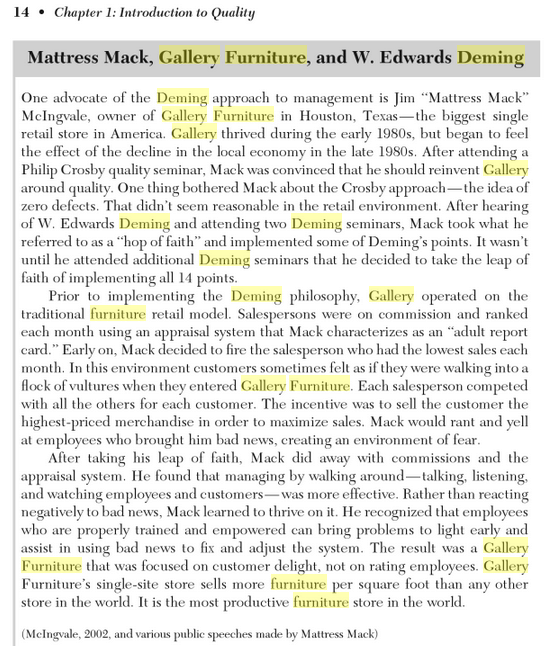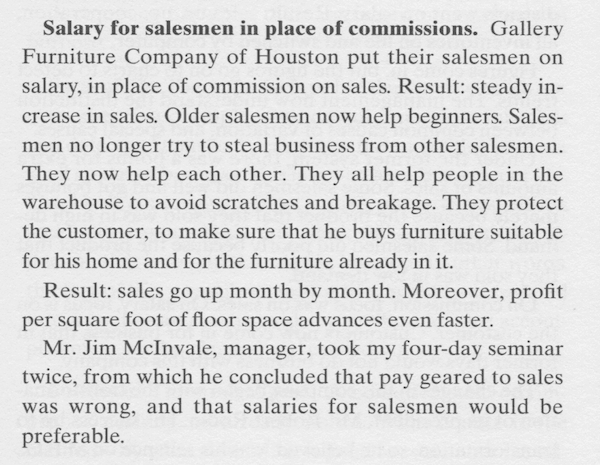Many healthcare organizations are non-profits. They provide some “community benefit” in terms of charity care (as do for-profit healthcare organizations).
Then, there are healthcare organizations that are very charity focused, where providing free care and social services is their primary mission. Some of these organizations even refuse to accept payment from insurance companies or the government when it's available.
There's a local San Antonio health organization that I've been talking to… trying to sort out if I will do some pro-bono work (as I like to do with true charities) or if I might do some consulting work.
When I was at their headquarters office this week, I had a chance to meet their CEO. As we were chatting and talking about the assistance and coaching I might be able to provide, he was recounting and sharing some of his experience with quality methodologies.
 He worked his way backward… from learning Six Sigma from Motorola some time ago, to TQM, and then, going back further… his time learning directly from the late, great Dr. W. Edwards Deming.
He worked his way backward… from learning Six Sigma from Motorola some time ago, to TQM, and then, going back further… his time learning directly from the late, great Dr. W. Edwards Deming.
The CEO recounted taking the famed four-day workshop in 1990 or 1991 (Deming passed away in late 1993). He talked about the System of Profound Knowledge and other core Deming concepts.
I thought, “Wow, this is going to be great working with this organization! To have a leader with this commitment to core quality principles is a huge advantage for anything we're going to do with ‘Lean' or ‘Kaizen.'”
The CEO asked if I remembered the story of “Mattress Mack,” the CEO of Houston-based Gallery Furniture, a company that Dr. Deming wrote about in his last book The New Economics for Industry, Government, Education. I vaguely remembered the story, but forgot the company name.
The CEO told me about the Gallery Furniture CEO Jim “Mattress Mack” McIngvale who changed his company from the typical retail setting to something far better for customers (and more profitable).
You can read about him (I hope) via a Google books preview of a different book or a screenshot below:

He moved away from commissions. He stopped routinely firing the lowest sales performance each month. They focused on customers and teamwork and created the “most productive furniture store in the world.”
Here is a scan from Deming's book:

You can also read this great article about Mattress Mack: “Retail Success Story: Gallery Furniture.”
One major difference — unlike most corporate (or healthcare) CEOs, his desk is not located in a fancy headquarters building:
You don't have to look very far to find the boss at Gallery Furniture. He works seven days a week and his desk is right up front, just inside the door of his flagship store.
The charity CEO I'm speaking of here is in a traditional office in a headquarters building… but it's hardly glamorous.
McIngvale was taught traditional MBA management:
Mack was “taught management at the University of Texas, a very conventional management structure. Somebody at the top, issuing all the orders, coming down throughout the organization. We had done fairly well that first four or five years. But as the business got bigger, we were lurching from one crisis to the next. We made some of the same mistakes over and over again. I knew there had to be a better way and I was actively searching for it.
He eventually found Dr. Deming. His first impressions were all positive:”
“This was a four day seminar but I stayed for only three days that time because his concepts of cooperation and win-win were so radical and off-center to me. I had grown up in a world of competition, I win, you lose, beat the other guy. A world of incentives, of building superstar mentality. But I knew in my heart that Dr. Deming was right and that he was certainly on to something.
But he came around:
“We started to see the business as a system, asking ourselves internally, person to person, ‘What can I do for you to make your job easier. And what can you do for me?' We wanted all the employees to come up to the level of being improvement project players.
You can read the rest of the story in that article.
These ideas are radical and off putting. It's challenging for me to bring up these ideas with clients and when to back off. Most of time, I'm introducing them to Deming concepts and trying to weave them into what I do with Lean and Kaizen. The idea of reducing blame of individuals… that's easy for people to accept (but hard to develop as a new habit).
Other ideas are harder — get rid of the performance review, get rid of quotas and targets, don't pay extrinsic rewards for participation in Kaizen or improvement work, understand common cause vs special cause variation. The 14 points aren't easy, but they're powerful.
What do you think of the Gallery story? What ideas could you incorporate into your organization? How would things be easier if you had a CEO who learned directly from Dr. Deming?
Please scroll down (or click) to post a comment. Connect with me on LinkedIn.
Let’s work together to build a culture of continuous improvement and psychological safety. If you're a leader looking to create lasting change—not just projects—I help organizations:
- Engage people at all levels in sustainable improvement
- Shift from fear of mistakes to learning from them
- Apply Lean thinking in practical, people-centered ways
Interested in coaching or a keynote talk? Let’s start a conversation.








![When Was the Last Time a Leader Around You Admitted They Were Wrong? [Poll]](https://www.leanblog.org/wp-content/uploads/2025/07/Lean-Blog-Post-Cover-Image-2025-07-01T212509.843-100x75.jpg)

I keep waiting for the enlightened approach for managing and paying salesmen to take off. In my heart, I agree with Deming- train and reward your people to work together as they focus on the customer. Yet it seems that individual commissions and the “rank and fire” approach is as popular as ever with American business.
In the ’80s and ’90s I was a salesman for IBM. And although they didn’t fire for poor performance (at that time, IBM still practiced full employment), the largest element of my variable pay was commission based on individual quota. This didn’t create a cut throat culture of me vs. my colleagues, but it didn’t promote much teamwork either. At the time, Digital Electronics Corporation, DEC, was our most feared competitor. IBM Sales both marveled and wondered about DEC’s practice of full salary for their sales force. How could that work? As outlined on Ken Olsen’s profile on American National Business Hall of Fame at http://www.anbhf.org/Fellows/Ken_Olsen.php:
I remember my customers talking about how DEC was more of a “partner” and would quickly marshal resources on their behalf to solve problems. IBM talked about that too, but because of the “what’s in it for me” culture prompted by individual quota, it was just harder and took longer.
Today, DEC is gone. And it seems that most technology companies favor individual quotas while holding a gun to the head of their salesmen in case they don’t perform that month.
Darwin would say that the best method survives. But in my heart, I long for Deming.
Thanks for the story, Mark.
I guess the demise of DEC was not due to their compensation structure (they had some real strategic problems, including the inability to shift into personal computers).
Many many companies are successful with the sales quota/commission approach and with rank and yank. Maybe they’re successful IN SPITE of that? Maybe they would be MORE successful without those approaches?
That’s hard to prove or disprove.
I did one podcast I did with a company CEO who was following the Deming model.
Highlights:
3:15 What does it mean to be a “Deming company?”
3:40 The Deming System of Profound Knowledge
4:00 The owner of OmniLingua had worked directly with Deming and appreciated the people aspects of his philosophy, how do you treat people with respect?
4:40 Has the annual review been abolished? Sales commissions were abolished, as well as production bonus plans. OmniLingua has a company-wide profit sharing plan instead.
5:15 More examples of the Deming philosophy in day-to-day life, including long-term sole-source supplier relationships
7:00 Is there still internal competition?
7:45 “Are we hiring salespeople who can’t sell?” by not having commissions